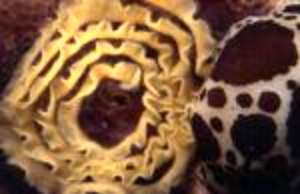Discodoris atromaculata from Greece
February 23, 2004
From: Mihalis Polyadis

Hi.
I am sending this message from Athens -Greece. I scuba dive and I am interested in seting up a tropical marine aquarium (SG 1025). (I already have one fresh water planted aquarium with Cichlids in it).
During some of my dives I saw the cow-colored species in the included photo. Do you know the scientific name or where can I look for further information. The dives took place 10 Miles Southern the city of Athens at Saronikos, Vouliagmeni Beach, (Aegean sea) and the depth was about 5-7 meters.
I also would like to know if i can acclimatize this ''cow snail'' to live from the Aegean's 1031 into tropical water's 1025. By the way your job with this site and the informations given are excellent.
Thank you in advance for your reply
Mihalis Polyadis
captmike@otenet.gr
Polyadis, M, 2004 (Feb 23) Discodoris atromaculata from Greece. [Message in] Sea Slug Forum. Australian Museum, Sydney. Available from http://www.seaslugforum.net/find/12270Dear Mihalis,
I am pretty sure your animal is Discodoris atromaculata which is a fairly common Mmediterranean nudibranch. I can't imagine the difference in Specific Gravity will cause any problem for the slug in your aquarium but what may cause a problem is its food.
Most nudibranchs are very specific feeders, each species eating only one or a few species of the type of animal they feed on. For example a nudibranch that eats sponges will not eat all sponges, but will only eat one or two closely related species. Discodoris atromaculata apparently only eats the sponge Petrosia ficiformis. There is a photo of the sponge in the species Fact Sheet. However, even if you can find the sponge while diving, you will have great difficulty keeping the sponge alive in your aquarium for the slug to feed on. Even healthy sponges are very difficult to keep alive in closed aquarium systems, but you are going to try and keep a sponge in your aquarium which is being eaten alive!
My advice is for you to look and appreciate the nudibranchs while you are diving, and leave your aquarium for animals which are less difficult to maintain in aquarium conditions
Best wishes
Bill Rudman
Related messages
-
Peltodoris atromaculata abnormality
From: Antoni López-Arenas i Cama, September 9, 2009 -
Re: Peltodoris atromaculata with damaged mantle
From: M. Baki Yokes, June 12, 2009 -
Re: Peltodoris atromaculata with damaged mantle
From: Dominique Horst, May 27, 2009 -
Peltodoris atromaculata from North Cyprus
From: Carol Cox, April 8, 2008 -
Peltodoris atromaculata from southern Portugal?
From: Pedro Alexandrino Monteiro, August 11, 2007 -
Discodoris atromaculata feeding
From: Anne Kloeppel, June 7, 2007 -
Discodoris atromaculata from Croatia
From: Gearoid Lane, March 30, 2006 -
Discodoris atromaculata on Petrosia ficiformis
From: Stephane Ores, January 13, 2006 -
Re: Discodoris atromaculata from Greece
From: Andrej Jaklin, February 25, 2004 -
Re: Discodoris atromaculata from Greece
From: Baki Yokes, February 24, 2004 -
Discodoris atromaculata from Adriatic
From: Adam Petrusek, October 8, 2003 -
Discodoris atromaculata from Holland
From: Andy den Boer, July 1, 2003 -
Discodoris atromaculata egg-ribbon
From: Marina Poddubetskaia, July 28, 2002 -
Discodoris atromaculata from France
From: Marina Poddubetskaia, June 28, 2002 -
Discodoris atromaculata from Greece
From: Fons Sarneel, March 19, 2002 -
Discodoris atromaculata from Greece
From: Peter H. van Bragt , April 29, 2001 -
Re: Food of Discodoris atromaculata
From: Juan Vicente López-Canales, February 15, 1999 -
Re: Photo of Discodoris atromaculata
From: Erwin Koehler, February 1, 1999 -
Food of Discodoris atromaculata
From: Juan Vicente López-Canales, January 28, 1999
